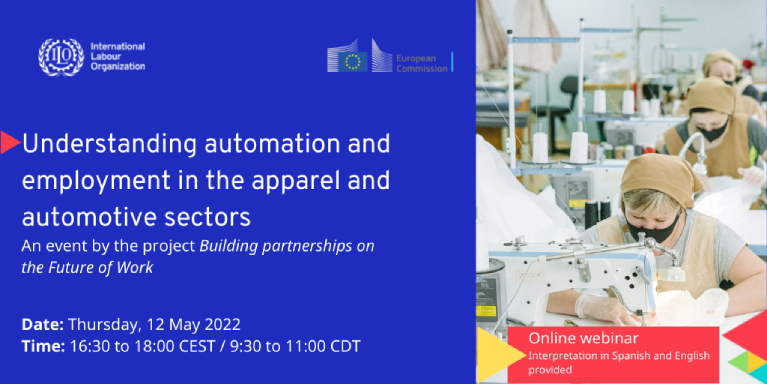Virtual webinar
Understanding automation and employment in the apparel and automotive sectors
Organized by the “Building Partnerships on the Future of Work” project, this webinar will bring together experts to share knowledge on the automotive, apparel and footwear industries and discuss technological change and the future of work in these sectors. Interpretation in English and Spanish will be provided.

The ILO and EC-JRC project “Building Partnerships on the Future of Work” aims at building new knowledge and informing future evidence-based policies addressing the effects of automation technologies in the apparel and automotive sectors on employment and their gender dimension. The main goal is to gain a better understanding of how processes of industrial automation (in particular those using digital technologies) interact with local social structures, cultural norms (including gender norms) and institutional systems in selected EU and non-EU countries, in the context of global value chains. In 2021, the project focused on building background knowledge on these two sectors, through desk research and data analysis, to pave the way for in-depth case studies planned for 2022 in selected manufacturing establishments across five countries, namely Germany, Indonesia, Mexico, Romania and Spain.
This webinar will bring together ILO and external experts, European and Mexican stakeholders, and constituents to share knowledge and discuss the future of work in the automotive and apparel and footwear industries. Automotive, apparel and footwear manufacturing have historically been instrumental in industrialization and structural transformation processes. These industries have fostered economic growth, provided entry points into the global economy and supply chains, and offered opportunities for formal jobs to workers in developing countries. In this context, the extent to which new and emerging technologies related to automation and digitization of production and supply chains transform the industry has important implications for workers and countries’ development trajectories.
The webinar will take place on Thursday, May 12, from 16:30 to 18:00 CEST / 9:30 to 11:00 CDT via Zoom.
Agenda
16.30 - 16.40 / 9.30 – 9.40Welcome
- Valeria Esquivel, Employment Policies and Gender Specialist, ILO
Presentation: Global value chain analysis of the automotive and garment industries: A study of Germany, Spain, Romania, Indonesia and Mexico for 2000-2014 - Presentation
- Gabriel Brondino, Post-doctoral Researcher, Università Cattolica del Sacro Cuore
16.50 -17.00 / 9.50 – 10.00
Presentation: Automation and its employment effects: A literature review of the automotive and garment sectors - Presentation
Presentation: Automation and its employment effects: A literature review of the automotive and garment sectors - Presentation
- Guendalina Anzolin, Post-doctoral Research Associate, Kings College London
Presentation: The state of the apparel and footwear industry: Employment, automation and their gender dimensions - Presentation
- David Kucera, Senior Economist, ILO
- Sheba Tejani, Lecturer in International Development, University of Birmingham
17.10.-17.25 / 10.10 – 10.25
Comments by Mexican and European experts
Comments by Mexican and European experts
- Jorge Carrillo, Researcher and Professor, El Colegio de la Frontera Norte
- Simona Moldovan, International Project Manager, Asociación de Investigación de la Industria Textil (Aitex)
17.25.-17.55 / 10.25 – 10.55
Q&A
Q&A
17.55.-18.00 / 10.55 – 11.00
Closing remarks